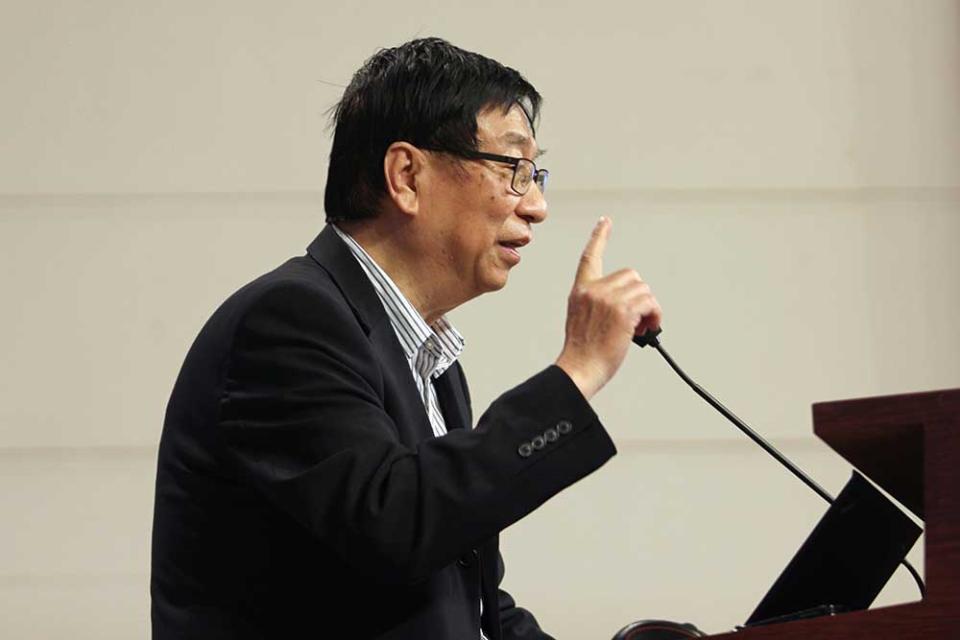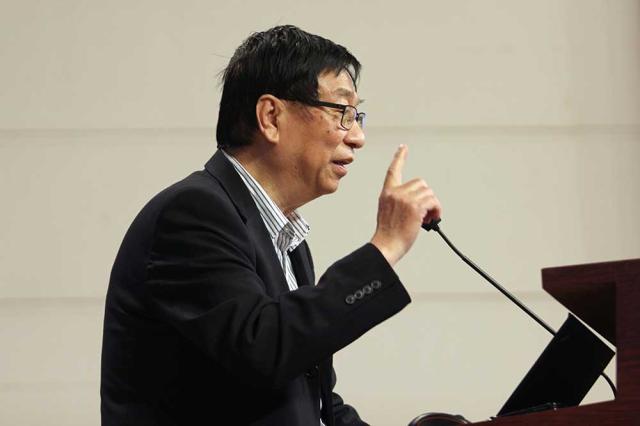enry Yiheng Zhao, a renowned cultural scholar, published an essay in China more than 10 years ago, chronicling the emergence and development of chicken-soup literature in foreign countries. The 71-year-old scholar taught in the UK for almost 30 years before retiring from the University of London and resettling in China in 2006 to teach at Sichuan University.
As a self-identified “cultural elitist,” Zhao despised the prevalence of the chicken-soup phenomenon in the West at the time he wrote his essay. Recently, however, when Zhao was asked about the topic, he said he was “self-critically” reconsidering his stance of “cultural elitism,” shocked by the development of popular culture in China today. “Never had I imagined that it would be so popular in China,” said Zhao.
“I’ve thought about this [chicken soup] phenomenon for half of my life, now I don’t want to be too picky about it anymore. Otherwise, I would put myself on the utter opposite side to the people.” Though he spoke slightly and softly, Zhao’s words reflected his complex thoughts on this issue.
The prevailing chicken soup culture in Chinese society, as Zhao argues, to some degree echoes the anti-elitist mood throughout the globe. He believes that it is the manifestation of populism in culture. “If the masses believe the chicken-soup content is nutritious for the soul, it’s better than nothing,” Zhao said.
NewsChina: Before the term “chicken soup for the soul” was imported from the US in the 1990s, China already had its local motivational culture. It has developed for nearly three decades now and has shifted in terms of subject and content along with changing social values. Why do you think chicken-soup culture thrives in Chinese society?
ZY: In many circumstances, the messages that chicken-soup materials convey are not wrong. Today’s China – as well as other countries – has to deal with basic moral problems. Comparatively speaking, people in religious nations can partially solve problems through abiding by religious doctrines. Chinese society, however, faces much more severe moral predicaments. Basic moral principles must be emphasized. How do you instill morals into people’s minds? If you choose an intricate, complicated, Dostoevsky-like style to deliver messages about humanity, most people will get confused and won’t buy it.
NC: In your opinion, is style the main problem of chicken-soup writing?
ZY: That is true. Chicken soup is a popular literary style. Most intellectuals feel uncomfortable with such common, popular, simple ways of expression. They believe it would make people’s thinking more shallow or even dumb them down. In addition to its content, its style is a problem that many well-educated people feel disconnected from. The typical chicken-soup style is to lecture readers in a very direct, didactical way. It tends to simplify problems and use shallow, sentimental language to manipulate readers’ emotions.
NC: Why do intellectuals react so disapprovingly to the sentimental chicken-soup way of expression?
ZY: Intellectuals tend to make judgments and deduce conclusions through independent thinking. Many ordinary people, however, are comparatively unaccustomed to thinking on their own. They prefer to be fed with conclusions and like to be repeatedly taught by others about the significance of certain principles. Everyone needs something to purify and lift their souls. Intellectuals have their own ways – they choose particular novels, films, theater or music that cater to their cultural tastes. Ordinary people need chicken-soup-for-the-soul kind of products for spiritual fulfillment. Although the style of chicken soup is lacking in artistic value, it is still necessary for many people.
NC: What do you make of chicken soup culture from a media studies perspective?
ZY: Chicken soup for the soul culture, stylistically, is designed for the masses – it is common and lacking in interpretative depth. Readers do not have to think much about it. After taking a quick glance at the opening, one can easily guess the conclusion. One important characteristic of chicken-soup stuff is that it is usually emotionally evocative, the language of which usually can easily arouse readers’ most basic emotions.
Apart from an emotional awakening, the motivational element in chicken soup culture makes a significant contribution to its popularity. According to my observations, Western self-help culture talks more about persistence in adversity, such as the power of the perseverance of a physically disabled person, and talks less about “how to become a top dog.” The self-help industry in China, however, is filled with motivational books on case studies of success, which is a Chinese characteristic. China has a long tradition of social climbing. Heavily influenced by the traditional culture oriented around the imperial examinations, people believe that study can change fate, lead to success and realize the climbing of social class.
NC: What are the social and cultural backgrounds that have created the chicken – soup phenomenon in China?
ZY: The predominance of chicken-soup culture is closely related to the country’s low levels of education. The population of the under-educated is huge. The majority of under-educated people don’t read books after leaving high school. They seldom read classic novels or poems. Thus sentimental, accessible, feel-good chicken soup articles become one of their main cultural choices.
China’s moral education is another factor. As a global phenomenon, motivational culture exists in both Western and Eastern countries, while it is particularly ubiquitous in China. I think the prominence of chicken-soup culture is partially due to China’s underdeveloped level of moral education. People in China hold a strongly utilitarian stance towards religious practices, hoping to gain secular benefits. Under such circumstance, chicken-soup books and articles to some extent play a role in the teaching of morals. Therefore, in an age of moral deficiency, I think intellectuals should not be too picky about chicken-soup culture.
NC: Different social classes may have different cultural demands and preferences. Does the boom of chicken-soup culture show this kind of cultural differentiation?
ZY: Indeed, such cultural differentiation once confused many Western intellectuals. The Frankfurt School [of social theory] once radically criticized pop culture. They lashed out at the situation in which art and culture had been severely alienated in the industrial society. They argued that the rising pop culture, which has been highly trivialized and commoditized, exacerbates the laborers’ status of alienation, destructs cultural diversity and threatens human civilization.
But since the 1960s, the cultural critics’ attitude towards pop culture has shifted. They believe that there are positive elements in pop culture and thus it is not appropriate to be too critical of it. Since then, intellectuals have kept withdrawing their elitist stance, and their retreat still continues today, as Bob Dylan wins a Nobel Prize for Literature.
Cultural differentiation is the dichotomy of elitist/pop culture. The postmodernists claim that the gap between the two cultures has disappeared. But I disagree with this point. Today this problem still exists, and the gap has not vanished. Nowadays, in China, social stratification does not necessarily lead to cultural differentiation. Too many variables affect one’s cultural preferences; and, it cannot be explained merely by the Marxist theory of production determinism, which used to be the analytical apparatus of cultural analysis in China.
NC: It seems that there is a change in your attitude towards chicken-soup culture. What has made you reconsider the chicken-soup phenomenon?
ZY: Indeed, my attitude towards chicken-soup culture has changed over years. I went abroad for study in the 1980s after the end of the Cultural Revolution, the time when postmodernism came into vogue in the West. I didn’t go in for the postmodernist destruction of the elitist/pop culture dichotomy, which, I thought, was a harmful iconoclastic power for elitist culture.
But when I returned to China, I recognized the deterioration of people’s sense of morals was a severe problem. Nobody helps an elderly person who fall on the street; and, worse still, some may fake a fall to then blackmail those who give a helping hand. People need to be further educated in moral conduct. On seeing this, I came to reconsider my attitude toward chicken-soup culture. People’s souls need to be purified in an effective way. If the public believe chicken soup is nutritious for their souls, it is better than nothing.
NC: Internet technology is accelerating the transformation of media and communication platforms. Does technology play a big part in boosting the unprecedented prominence of cyber chicken-soup culture?
ZY: That’s true. Thanks to technological advancement, information spreads faster and faster, which precipitates the evolution of literature formats. On social networking platforms, such as Sina Weibo, Tencent’s WeChat, Snapchat and Twitter, information becomes much shorter, more and more fragmented and simplified. With such tendencies, if one means to write a widespread and morally worthwhile article, the chicken-soup format might become the optimal choice.
Nowadays, anti-elitism has become a global phenomenon. The victory of Donald Trump and Brexit reflect this globally prevailing mood. The rise of populism has become a worldwide tendency. The prominence of chicken-soup culture in China is related to people’s level of knowledge. To some extent, it is a manifestation of cultural populism that chicken-soup content dominates Chinese people’s consumption of culture. Even though well-educated people cannot appreciate chicken soup, they still need to make compromises, reconcile themselves with the trend, and find common ground with the public.

 Old Version
Old Version
